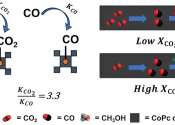New process quickly transforms livestock manure into biochar
A technology has been developed to quickly convert livestock manure, a significant issue in animal farming, into valuable "black gold" rich in carbon within a day.

A technology has been developed to quickly convert livestock manure, a significant issue in animal farming, into valuable "black gold" rich in carbon within a day.
Biotechnology
Apr 26, 2024
1
145

A "rapid and far-reaching change" is necessary to prevent catastrophic climate change, according to the Intergovernmental Panel on Climate Change (IPCC). "However, the transformation of the economy towards climate neutrality ...
Environment
Apr 15, 2024
1
86

Climate change caused by CO2 emissions already in the atmosphere will shrink global GDP in 2050 by about $38 trillion, or almost a fifth, no matter how aggressively humanity cuts carbon pollution, researchers said Wednesday.
Environment
Apr 20, 2024
2
81

The impact of human activities—such as greenhouse gas emissions and deforestation—on Earth's surface have been well-studied. Now, hydrology researchers from the University of Arizona have investigated how humans impact ...
Earth Sciences
Apr 28, 2024
0
130

Colonies of emperor penguin chicks were wiped out last year as global warming eroded their icy homes, a study published Thursday found, despite the birds' attempts to adapt to the shrinking landscape.
Ecology
Apr 25, 2024
2
4165

New research has found a "missing piece of the puzzle" of West Antarctic Ice Sheet melt, revealing that the collapse of the ice sheet in the Ross Sea region can be prevented—if we keep to a low-emissions pathway.
Earth Sciences
Apr 23, 2024
0
146

Researchers at the University of Michigan have developed a catalyst material known as cobalt phthalocyanine that converts carbon dioxide—a significant driver of climate change—into renewable fuels such as methanol.
Analytical Chemistry
May 6, 2024
0
211

In Mali's capital Bamako, Aboubacar Pamateck runs a scarf under a trickle of water and wraps it around his head to cope with the West African nation's soaring heat.
Environment
Apr 21, 2024
0
48

A method based on CT (computed tomography)—a type of imaging that is widely used in hospitals—can help improve our understanding of CO2 storage, batteries, and processes in the body such as nutrient uptake.
Soft Matter
Apr 9, 2024
0
21

The North Pole region heats up faster than the rest of the world. Though this is a known fact, climate models underestimate the speed with which the region warms up. Sjoert Barten obtained his PhD on this subject at Wageningen ...
Earth Sciences
May 3, 2024
1
19
Greenhouse gases are gases in an atmosphere that absorb and emit radiation within the thermal infrared range. This process is the fundamental cause of the greenhouse effect. Common greenhouse gases in the Earth's atmosphere include water vapor, carbon dioxide, methane, nitrous oxide, and ozone. In our solar system, the atmospheres of Venus, Mars and Titan also contain gases that cause greenhouse effects. Greenhouse gases greatly affect the temperature of the Earth; without them, Earth's surface would be on average about 33°C (59°F) colder than at present.
Human activities since the start of the industrial era around 1750 have increased the levels of greenhouse gases in the atmosphere. The 2007 assessment report compiled by the IPCC observed that "changes in atmospheric concentrations of greenhouse gases and aerosols, land cover and solar radiation alter the energy balance of the climate system", and concluded that "increases in anthropogenic greenhouse gas concentrations is very likely to have caused most of the increases in global average temperatures since the mid-20th century".
This text uses material from Wikipedia, licensed under CC BY-SA